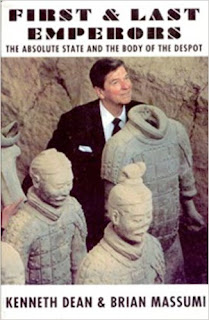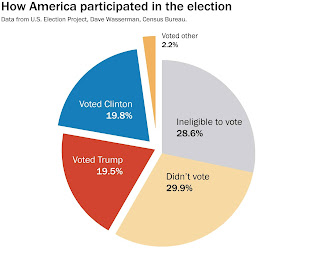Since the election of Trump there seems to be a consensus that his surprising victory stemmed from anger and frustration on the part of the electorate. The only question that follows in most analysis is what is the nature of anger. Is it classed based, frustration at globalization the loss of industrial jobs, and a recovery that seems to have only benefited the elite? Or is it race based, anger at changing demographics and a steady decline of the wages of whiteness? Of course most answer that it is in some sense both, either through the mythic "white working class," which merges race and class in a handy formula or, in a more sophisticated way, arguing that Trump always framed class in racist terms, economic uncertainty became immigrants and globalization become China.
I would like to ask a different question, not is this "good anger," anger at alienation, exploitation, or precarization, or "bad anger," anger at foreigners, others, and the decline of whiteness as the majoritarian standard, or some mixture of the two? Instead I would like to ask how does anger, or any affect, become mobilized, or how does any politics become lived as affective intensities? How do affects determine politics, and how do the figures, narratives, and dramas of politics shape and determine affects.
Two models come to mind, one as I have already suggested, is to think in terms of what Deleuze and Guattari call an apparatus of capture. An apparatus of capture necessarily has two moments, monopolistic appropriation and direct comparison. The former necessary precedes the latter. That is the central paradox. To take labor as our example, "Surplus labor is not that which exceeds labor; on the contrary, labor is that which is subtracted from surplus labor and presupposes it." The monopolistic instance, surplus labor in the case of labor or taxes in the form of money, is necessarily prior to and the precondition of the direct comparisons. This drastically separates Deleuze and Guattari from those who see the monopolistic appropriation as a parasitical excess to direct comparison, who fantasize about exchange without a central institution, or labor without capital.
How then to think politics, electoral politics as an apparatus of capture, as the capture of affects? It seems fairly clear that the president can be considered the very figure of monopolistic appropriation. The president in American politics is presented less as a candidate for the executive branch, or even a representative of one of the parties, but as a kind of strange attractor for emotions, moods, and affects. The presidential election is a referendum on the general mood economy, of fears, hopes, and nostalgia. These various affects or emotions become comparable, become intelligible only in and through their appropriation, they coalesce around a central figure. Hope, rage, and fear become identifiable and comparable only once given a name. Here it is useful to revisit the distinction between emotion and affect, in which the former is named and identified while the latter persists as virtual and inchoate. The electoral apparatus of capture converts affects into emotions by attaching them to specific figures. If one wanted to expand the reference to Deleuze and Guattari's work, one would say that this apparatus falls back on the very emotions, and affective intensities, that animate it, appearing to be their cause and condition (more on this below).
As a conceptual model or machine the apparatus of capture has as its strongest point the centrality it ascribes to hierarchy, or the fact that it makes monopoly prior to identity. Its limit is that in thematizing power as capture it presupposes some kind of outside, some kind of nomad before the state, or affect before emotion. The merits of these different outsides depend on the situation, but in the case of the electoral apparatus of capture it posits an inchoate anger or frustration existing prior to its capture by the Trump machine. This is the logic underlying countless thinkpieces that saw parallels between Sanders and Trump, parallels grounded, when they were more than just statements of the centrist consensus, on the inchoate anger existing prior to its capture.
This brings us to the second model for thinking the political organization of the affects, what Frédéric Lordon and Yves Citton call "immanent transcendence." Immanent transcendence can be understood as a particular intervention in Marxist-Spinozism, squaring the circle between Negri (and Deleuze) who understand Spinoza to be developing a philosophy of immanence, in which the affects are their own self-organization and Althusser who reads Spinoza as a philosopher of subjection, in which the subject is always already constituted in its subjection to the Subject. In the first imagination is creation in the second it is subjection. More importantly immanent transcendence is a way to argue that although the social, and with it the state, is nothing other than affects and strivings of the multitude of individuals that compose it, it always appears, and is experienced, as something more. The collectivity and organization of our affects appears to us as something greater, as the cause and not the effect of our individual hopes and fears, hates and loves. As Lordon writes, "The social is necessarily a transcendence, but a transcendence of a particular dimension, an immanent transcendence." We produce that which exceeds us, and the effect of that production becomes a cause, as affects are intensified and solidified through their imitation. It is still a matter of capture, but what captures appears to produce that which it captures.
This feedback loop perhaps explains the structure of feeling of the current moment. As much as those oppose Trump tell themselves that he won a historically small portion of the vote, losing the popular vote, and coming in with lower totals than Romney or McCain, as Spinoza writes "there is a limited efficacy of the true insofar as it is true" and it feels as if the anger and hostility that Trump made central to his campaign are intensified. It feels as if the entire nation is pick-up with a "Trump that Bitch" bumper sticker cruising along and rolling coal. This has led to despair for many. However, for others it is not the case, and the concept of immanent transcendence might offer some way to explain all of the racist graffiti, hostile interactions, racist taunts and threats that make up social life. These feelings always existed but the effect of their supposed social recognition and validation intensifies and strengthens them. Affects are always strengthened by their imitation, and that imitation is further intensified when people imitate the very embodiment of the state.
Two practical conclusions follow: One, it will be necessary to resist despair, the hopeless feeling that one "loves alone." Second, it is necessary to fracture the loops that intensify hatred and anger. Part of this second strategy no doubt involves transforming the articulation of affects. Yes, there are legitimate grounds for anger and insecurity, but the conceding that point does not cede an inch on the intolerable form that anger and insecurity takes.



1 comment:
Thank you.
Post a Comment